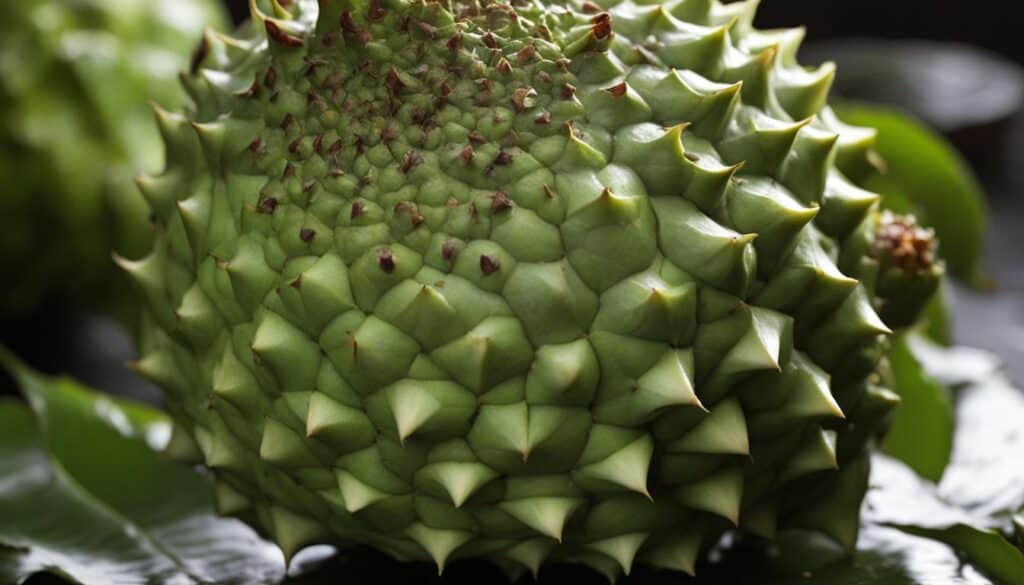One of the best things about eating abroad is discovering the delicious exotic fruits around the world. Exotic fruits offer unique flavors and benefits, making them a tasty exploration for fruit lovers. In this article, we will delve into fruits that are similar to mango, uncovering a variety of tropical and exotic options that can serve as substitutes or alternatives to mango. Whether you’re a fan of the mango flavor or simply looking to explore new and exciting fruits, this article will guide you through a mouthwatering journey.
Key Takeaways:
- There are various tropical and exotic fruits that can serve as substitutes or alternatives to mango.
- Cherimoya, also known as the custard apple, is a tropical fruit with a creamy texture and tropical flavor similar to mango.
- Sweetsop, also known as sugar apple, is a round fruit with a sweet and creamy flesh that resembles the knobbly cousin of cherimoya.
- Jackfruit, a popular vegan substitute, has a mild fruity flavor and a starchy flesh, making it a versatile option for savory dishes.
- Exploring fruits similar to mango allows fruit lovers to discover new and exciting flavors while enjoying the benefits of tropical and exotic fruits.
Cherimoya: The Creamy Tropical Delight
When it comes to finding a fruit similar to mango, look no further than the cherimoya, also known as the custard apple. This tropical delight has a creamy texture and a tropical flavor that is often compared to mango. Native to the Andes in South America, cherimoya has made its way to various regions around the world such as South East Asia, Hawaii, Southern Europe, and parts of Africa.
The taste of cherimoya falls somewhere between a pineapple and a banana, making it a delightful option for those craving the flavors of mango. Not only is cherimoya delicious, but it also offers a range of health benefits. This tropical fruit is packed with high fiber, iron, potassium, vitamin C, and B vitamins. It is even believed to have cytotoxins that may have potential health benefits in combatting various diseases.
So, whether you’re in search of a mango substitute or simply looking to indulge in a new and exciting tropical fruit, cherimoya is a must-try. Its creamy texture, tropical flavor, and numerous health benefits make it a truly delightful addition to your fruit repertoire.
The Nutritional Value of Cherimoya
| Nutrient | Amount per 100g |
|---|---|
| Calories | 75 |
| Fiber | 3g |
| Iron | 0.6mg |
| Potassium | 287mg |
| Vitamin C | 15.6mg |
| Vitamin B6 | 0.25mg |
As you can see from the table above, cherimoya is not only a tasty fruit but also a nutritious one. It is low in calories, high in fiber, and packed with essential vitamins and minerals that promote overall health and well-being.
So, the next time you’re craving the taste of mango or looking for a tropical treat, give cherimoya a try. Its creamy texture, tropical flavor, and array of health benefits make it a winning choice for fruit lovers everywhere.
Sweetsop: The Sweet and Creamy Cousin of Cherimoya

If you’re in search of a delectable fruit with a mango-like flavor, look no further than the sweetsop, also known as sugar apple. This tropical fruit, with its round or heart-shaped appearance, bears a striking resemblance to its knobbly cousin, cherimoya. The sweetsop boasts a sweet and creamy flesh that has a custard-like texture, making it a delightful alternative for mango enthusiasts.
Native to the West Indies and tropical areas of South America, the sweetsop has made its way to many other tropical regions around the globe. It offers not only a succulent taste but also a range of health benefits. Rich in potassium, magnesium, iron, riboflavin, B vitamins, and vitamin C, this tropical delight provides a nutritional boost while satisfying your sweet tooth.
To truly appreciate the mango-like flavor of the sweetsop, it’s best enjoyed fresh and chilled. Simply cut through the bumpy skin to reveal the luscious, white flesh filled with black seeds. Each bite is a burst of tropical goodness that transports you to a sun-soaked paradise.
The versatility of the sweetsop allows for various culinary explorations. From incorporating it into smoothies and desserts to using it as a topping for yogurt or ice cream, the possibilities are endless. Its sweet and creamy nature makes it the perfect ingredient for creating indulgent treats.
Distinguishing Features of Sweetsop
| Feature | Description |
|---|---|
| Appearance | Round or heart-shaped fruit with a bumpy skin |
| Flavor | Mango-like taste with a sweet and creamy texture |
| Health Benefits | Rich in potassium, magnesium, iron, riboflavin, B vitamins, and vitamin C |
| Origin | Native to the West Indies and tropical areas of South America |
| Usage | Perfect for enjoying fresh, chilled, or incorporating into various culinary creations |
Jackfruit: The Meaty Vegan Favorite
When it comes to finding a vegan substitute for meat, look no further than jackfruit. This tropical fruit, native to South and Southeast Asia, is gaining popularity in North America for its meat-like texture and versatility in savory dishes. Whether you’re vegan, vegetarian, or simply looking to reduce your meat intake, jackfruit is a delicious and nutritious option to explore.
With its mild fruity flavor and starchy flesh, jackfruit has been a staple in regional diets for centuries. It can be purchased fresh, canned, or frozen, making it convenient for any culinary adventure. From pulled pork tacos to BBQ sandwiches, jackfruit provides a satisfyingly meaty texture without any animal products.
What sets jackfruit apart from other vegan meat substitutes is its status as a low glycemic food. This means that it has a minimal impact on blood sugar levels, making it a smart choice for those managing their sugar intake. But don’t let its low glycemic nature fool you – jackfruit is still packed with nutrients. It’s a good source of protein, vitamin A, fiber, copper, manganese, and more.
FAQ
Are cherimoya and custard apple the same fruit?
Yes, cherimoya is also known as custard apple.
Where is cherimoya grown?
Cherimoya is native to the Andes in South America but is now grown in various regions such as South East Asia, Hawaii, Southern Europe, and parts of Africa.
What are the health benefits of cherimoya?
Cherimoya is high in fiber, iron, potassium, vitamin C, and B vitamins. It is also believed to have cytotoxins that may have potential health benefits in combating various diseases.
What is sweetsop?
Sweetsop is also known as sugar apple and is a round or heart-shaped fruit that resembles the knobbly cousin of cherimoya.
Where is sweetsop native to?
Sweetsop is native to the West Indies and tropical areas of South America.
What are the nutritional benefits of sweetsop?
Sweetsop is a source of potassium, magnesium, iron, riboflavin, B vitamins, and vitamin C.
What is jackfruit?
Jackfruit is a tropical fruit that originated in South and Southeast Asia.
How is jackfruit used as a vegan substitute?
Jackfruit has a starchy flesh that is often used as a vegan substitute for pulled pork in tacos and sandwiches.
Is jackfruit a nutritious fruit?
Yes, jackfruit is a source of protein, vitamin A, fiber, copper, manganese, and other nutrients. It is also a low glycemic food, meaning it has a minimal impact on blood sugar levels.
Please note that the answers provided are based on general knowledge and individual experiences may vary.





Leave a Reply